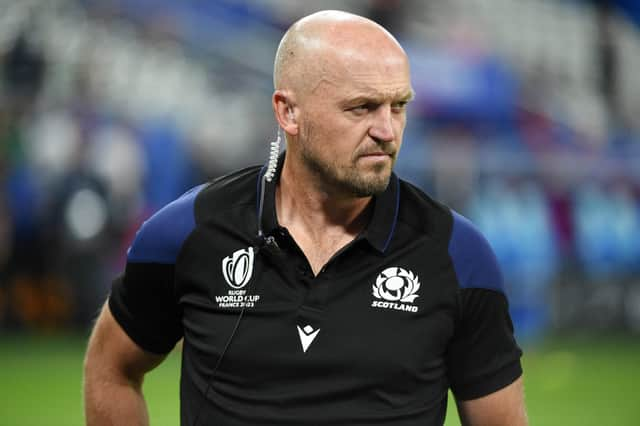Gregor Townsend World Cup performance reviewed as Mark Dodson seeks way to catch the top four


Mark Dodson, Scottish Rugby’s long-serving chief executive, intends to keep the findings in-house but admitted his main concern was finding a way to bridge the gap between Gregor Townsend’s side and the top four in the world.
Scotland went into this year’s tournament ranked fifth but found themselves drawn in a pool with the top two, Ireland and South Africa, and were eliminated at the group stage for the second time in a row. The Springboks defeated New Zealand in the final, while hosts France and Ireland were knocked out in the quarter-finals. Those ‘big four’ seemed streets ahead of the rest and Dodson acknowledged it was a problem he and Townsend must tackle.
Advertisement
Hide AdAdvertisement
Hide Ad“We talked long and hard and there is a belief that we are close but not as close as we want to be to the top four sides in the world,” said the chief executive. “We were at fifth but there is a gap to the top four and we are working really hard towards the Six Nations to correct what we feel we could have done better in the World Cup.
“The gap is there. The issue is how do we bridge that gap? If we are playing at our best we can trouble any side in the world, I thought we played well but not well enough. The question is how do we turn some of our previous performances when we can knock off any side in the world to a consistency of performance? That is where the key is.”
Scotland have now fallen to sixth in the world on the back of their performance by France - overtaken by England - and, as is standard, a review is ongoing into the performance which saw Townsend’s side beat Tonga and Romania in between the two defeats. The head coach’s job is safe - he signed a new contract before the tournament tying him to the post until April 2026 - and he will lead Scotland into next year’s Six Nations which kicks off with an away game against Wales on February 3.
“We do a formal review after every tournament,” said Dodson, speaking after the Scottish Rugby Union’s annual general meeting at Murrayfield, where accounts were signed off showing record revenues of £68.3m but losses of over £10m for the year up to 31 May 2023. “We keep it in-house and look at the things that went well and the things that went bad. And the national team does its own review for its own purposes with the squad. Gregor is coming to the end of his and we have had all our conversations all concluded.”
Dodson wouldn’t reveal who else was involved in the review but the chief executive is likely to have been assisted by Jim Mallinder, Scottish Rugby’s performance director. “Whether it is any coach - Gregor, Vern [Cotter], Andy Robinson, Scott Johnson - they don't get to mark their homework,” added Dodson.
He acknowledged that the paucity of native talent coming through was a major concern, illustrated most vividly by the national under-20 side’s struggles, and hopes that a review of the pathway system will help.
“It is justifiable to say we have underperformed at that level,” said Dodson. “The last four or five years we have not done justice to ourselves. We have just undertaken the biggest review of our pathways from under-16s all the way to our pro teams and we have included in that review the CRB (club rugby board) and have representatives of the Premiership, National One, Super6, high performance, national team and external consultants as well to look at what is the right methodology for Scotland and how do we drive people through.
“There are a variety of reasons why we are not as strong as other countries at under-20 level. [One is] the level of opportunities our under-20s get when you have a two pro-team environment compared with France with 14 and England with ten. We need to look at the quality of games played between ages 18 and 23 in Scotland and some of the strength and conditioning has to be done earlier. The guys we have been facing from Italy, Georgia and the other nations are physically bigger.”
Advertisement
Hide AdAdvertisement
Hide AdDodson said that one of the consequences of the review would be an overhaul of the Super Series/Super 6, the semi-pro tournament introduced in an attempt to bridge the gap between the club and professional games, and he still harboured hopes of working with Italian rugby to provide more high level opposition, an idea first floated when Franco Smith took over at Glasgow Warriors. “Super6 is part of the review process,” said Dodson. “We may or may not continue.”
Another issue to come up at the agm was the state of Murrayfield and the need to upgrade parts of the old stadium. Given the importance of rugby ticket income to the SRU - it accounted for more than a third of the £68.3m revenue - it’s no surprise that the governing body is looking at ways of improving facilities but the focus looks likely to be on the lucrative hospitality market rather than the ordinary fan.
Asked if it would be possible to increase the ground’s 67,000 capacity, Dodson said: “I think capacity is not an issue. I think we’ve got plenty of seats. It is what I said before, I need more price points, I need to bring people in who can spend more of their discretionary income not just on their ticket but on dwell time around the stadium. I think if somebody asked what your preference would be between an 80,000-seater stadium or a 67,000-seater stadium with another 10 to 15 per cent hospitality places, it would be the latter.”
Comments
Want to join the conversation? Please or to comment on this article.
